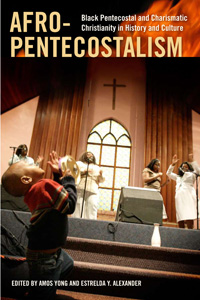Afro-Pentecostalism, reviewed by Wolfgang Vondey
 Amos Yong and Estrelda Alexander, eds., Afro-Pentecostalism: Black Pentecostal and Charismatic Christianity in History and Culture (New York: New York University Press, 2011), 261 pages, ISBN 9780814797310.
Amos Yong and Estrelda Alexander, eds., Afro-Pentecostalism: Black Pentecostal and Charismatic Christianity in History and Culture (New York: New York University Press, 2011), 261 pages, ISBN 9780814797310.
Black pentecostal and charismatic Christianity has long been one of the most neglected topics of North American religious history and culture. Estrelda Alexander, an African American professor of theology, and otherwise known for her work, Black Fire: One Hundred Years of African American Pentecostalism (Intervarsity), and Amos Yong, an Asian American professor of theology, both at Regent University, haven taken on the project to provide a pioneering and multidisciplinary collection of scholars who collaborate on closing the gap on the Black dimensions of the Pentecostal movement. In this groundbreaking work, fourteen scholars discuss the complex reality noted in the title of the book as “Afro-Pentecostalism,” including classical Wesleyan Holiness Pentecostals, classical Apostolic groups, also known as Oneness Pentecostals, charismatic independent Pentecostals, and recent neo-Pentecostals within the wider Black Church tradition. The result is a unique, insightful, multidisciplinary, interracial collection that should complement every library on contemporary Pentecostalism.
After a general introduction by the editors on the shifting strategies and changing discourses of Afro-Pentecostalism, the collection unfolds in five parts: (1) origins, (2) gender and culture, (3) prophetic ethics, (4) pneumatology, and (5) Afro-Pentecostalism in global context. The book features predominantly African American authors, including David Daniels, Leonard Lovett, William Turner, and Frederick Ware (all Pentecostal), as well as Valerie Cooper, Clarence Hardy, Cheryl Sanders, and Ogbu Kalu (all not Pentecostals), and is complemented by the white scholars Cecil M. Robeck, Jr. (Pentecostal) joined by Louis Gallien, Craig Scandrett-Leatherman, and Dale Irvin (all not Pentecostals). Bringing together insights from within and without the Pentecostal traditions and African American Pentecostalism, the chapters draw on historical studies, theology, cultural anthropology, ethics, missiology, and religious studies that cross the borders of color, race, and ethnicity.
The history of modern-day Pentecostalism is still in its infant stage. At this crucial moment of telling the Pentecostal story, a typical syndrome of Pentecostal historiography is racial exclusiveness. Perhaps a form of “narrative racism,” or more likely ignorance and habit, the stories tend to be told in exclusively black or white perspectives. Moreover, those who tell the stories tend to align with the color of choice: white Pentecostals tell a white history, Black Pentecostalism is narrated by the African American community. In contrast, Afro-Pentecostalism sheds new “color” on a story that is one of conflict (narrated by Robeck’s essay) and the need to “navigate the territory” (Daniels’ essay) between civil and religious communities divided by race and ethnicity. This larger history is reflected in the story of women in Afro-Pentecostalism (narrated by Cooper and Hardy) and the rhymes and rhythms of African American culture (told by Scandrett-Leatherman and Gallien). The result of cultural and religious suppression on the surface is a prophetic mode of existence and operation (narrated by Sanders and Lovett). In the depths of the theological terrain, Afro-Pentecostalism also contributes unique insights for the theological task, particularly the renaissance of pneumatology (narrated by Turner) and Black Liberation Theology (told by Ware). From these various roots, Afro-Pentecostalism has expanded to global contexts (narrated by Kalu and Irvin).
The essays are strong and personal narratives of a present-day Pentecostalism, not observations of a bygone era. Individual essays can easily serve as discussion starters in churches and college courses. Most essays are critical, often self-critical, of the status quo among a racially divided Pentecostal movement. Afro-Pentecostalism is an important contribution to initiate the end of racial divisions by telling shades of the Pentecostal story that have long been neglected. Editorial introductions to each section further chart the trajectories and shape the larger story of the Black Church and the Pentecostal movement.
Category: Church History, Fall 2012, Pneuma Review


